Related Research Articles

A triathlon is an endurance multisport race consisting of swimming, cycling, and running over various distances. Triathletes compete for fastest overall completion time, racing each segment sequentially with the time transitioning between the disciplines included. The word is of Greek origin, from τρεῖς or treis (three) and ἆθλος or athlos (competition).

In sport, racing is a competition of speed, against an objective criterion, usually a clock or to a specific point. The competitors in a race try to complete a given task in the shortest amount of time. Typically this involves traversing some distance, but it can be any other task involving speed to reach a specific goal.
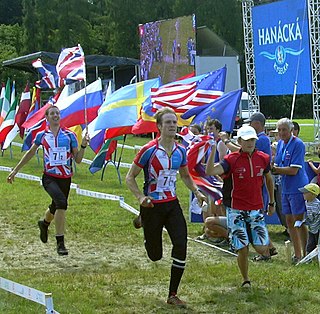
A relay race is a racing competition where members of a team take turns completing parts of racecourse or performing a certain action. Relay races take the form of professional races and amateur games. Relay races are common in running, orienteering, swimming, cross-country skiing, biathlon, or ice skating. In the Olympic Games, there are several types of relay races that are part of track and field. Relay race, also called Relay, a track-and-field sport consisting of a set number of stages (legs), usually four, each leg run by a different member of a team. The runner finishing one leg is usually required to pass the next runner a stick-like object known as a "baton" while both are running in a marked exchange zone. In most relays, team members cover equal distances: Olympic events for both men and women are the 400-metre and 1,600-metre relays. Some non-Olympic relays are held at distances of 800 m, 3,200 m, and 6,000 m. In the less frequently run medley relays, however, the athletes cover different distances in a prescribed order—as in a sprint medley of 200, 200, 400, 800 metres or a distance medley of 1,200, 400, 800, 1,600 metres

Wreck diving is recreational diving where the wreckage of ships, aircraft and other artificial structures are explored. Although most wreck dive sites are at shipwrecks, there is an increasing trend to scuttle retired ships to create artificial reef sites. Diving to crashed aircraft can also be considered wreck diving. The recreation of wreck diving makes no distinction as to how the vessel ended up on the bottom.

Adventure racing is typically a multidisciplinary team sport involving navigation over an unmarked wilderness course with races extending anywhere from two hours up to two weeks in length. (What Is Adventure Racing Video) Some races offer solo competition as well. The principal disciplines in adventure racing include trekking, mountain biking, and paddling although races can incorporate a multitude of other disciplines including climbing, abseiling, horse riding, skiing and white water rafting. Teams generally vary in gender mix and in size from two to five competitors, however, the premier format is considered to be mixed gender teams of four racers. There is typically no suspension of the clock during races, irrespective of length; elapsed competition time runs concurrently with real time, and competitors must choose if or when to rest.

Cyclo-cross is a form of bicycle racing. Races typically take place in the autumn and winter, and consist of many laps of a short course featuring pavement, wooded trails, grass, steep hills and obstacles requiring the rider to quickly dismount, carry the bike while navigating the obstruction and remount. Races for senior categories are generally between 40 minutes and an hour long, with the distance varying depending on the ground conditions. The sport is strongest in the traditional road cycling countries such as Belgium, France and the Netherlands.
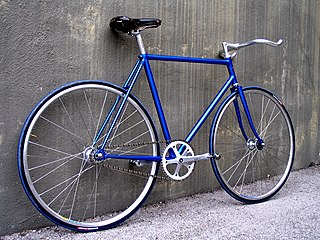
A fixed-gear bicycle is a bicycle that has a drivetrain with no freewheel mechanism. The freewheel was developed early in the history of bicycle design but the fixed-gear bicycle remained the standard track racing design. More recently the "fixie" has become a popular alternative among mainly urban cyclists, offering the advantage of simplicity compared with the standard multi-geared bicycle.
Warren Wilson College (WWC) is a private liberal arts college in Swannanoa, North Carolina. WWC is known for its curriculum that combines academics, work, and service. This system requires every student to complete a requisite course of study, work an on-campus job, and perform community service. Warren Wilson is one of the few colleges in the United States that requires students to work for the institution in order to graduate and is one of only nine colleges in the Work Colleges Consortium.
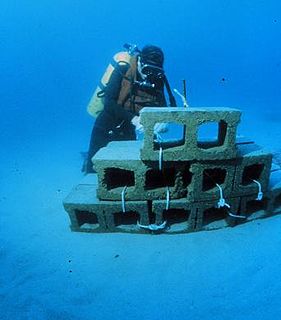
An artificial reef is a human-created underwater structure, typically built to promote marine life in areas with a generally featureless bottom, to control erosion, block ship passage, block the use of trawling nets, or improve surfing.

Sport in Ireland plays an important role in Irish society. The many sports played and followed in Ireland include association football, Gaelic games, horse racing, show jumping, greyhound racing, basketball, fishing, handball, motorsport, boxing, tennis, hockey, golf, rowing, cricket, and rugby union.
Due to the nature of triathlons as a race consisting of multiple sports many pieces of technical equipment have been borrowed from other sports, or developed specifically in an effort to race faster and improve a competitors safety.

Finswimming is an underwater sport consisting of four techniques involving swimming with the use of fins either on the water's surface using a snorkel with either monofins or bifins or underwater with monofin either by holding one's breath or using open circuit scuba diving equipment. Events exist over distances similar to swimming competitions for both swimming pool and open water venues. Competition at world and continental level is organised by the Confédération Mondiale des Activités Subaquatiques (CMAS). The sport's first world championship was held in 1976. It also has been featured at the World Games as a trend sport since 1981 and was demonstrated at the 2015 European Games in June 2015.

Downhill mountain biking (DH) is a genre of mountain biking practiced on steep, rough terrain that often features jumps, drops, rock gardens and other obstacles.
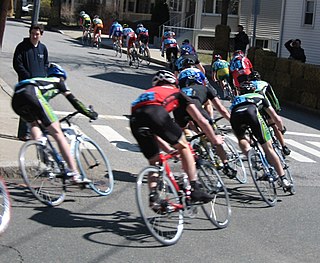
A criterium, or crit, is a bike race consisting of several laps around a closed circuit, the length of each lap or circuit ranging from about 400 m to 10,000 m.

This is a glossary of terms and jargon used in cycling, mountain biking, and cycle sport.

An alley cat race is an unsanctioned bicycle race. Alley cats almost always take place in cities, and are often organized by bicycle messengers. The informality of the organization is matched by the emphasis on taking part, rather than simple competition. For instance, many alleycats present prizes for the last competitor to finish . The first race to be called an 'alley cat' was held in Toronto on 30 October 1989 and continued, in its original form, around Halloween and Valentine's Day for the following five years. In 1993, when Toronto messengers shared Alleycat stories at the first international messenger race, the name and the concept spread far and wide. Regularly organized Alleycats can be found in cities across North America, Europe and Asia. Many smaller cities with no cycle messenger population are also home to alleycats run by the burgeoning urban cyclist subculture.

Cycling in New York City is associated with mixed cycling conditions that include dense urban proximities, relatively flat terrain, congested roadways with "stop-and-go" traffic, and streets with heavy pedestrian activity. The city's large cycling population includes utility cyclists, such as delivery and messenger services; cycling clubs for recreational cyclists; and increasingly commuters. Cycling is increasingly popular in New York City; in 2018 there were approximately 510,000 daily bike trips, compared with 170,000 daily bike trips in 2005.
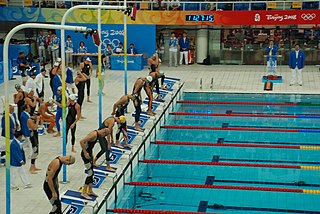
Swimming is an individual or team racing sport that requires the use of one's entire body to move through water. The sport takes place in pools or open water. Competitive swimming is one of the most popular Olympic sports, with varied distance events in butterfly, backstroke, breaststroke, freestyle, and individual medley. In addition to these individual events, four swimmers can take part in either a freestyle or medley relay. A medley relay consists of four swimmers who will each swim a different stroke, ordered as backstroke, breaststroke, butterfly and freestyle.
RideLondon, known through sponsorship as Prudential RideLondon, is an annual festival of cycling held in London. It was developed by the Mayor of London, London and Partners and Transport for London in partnership with Surrey County Council, and is managed by London & Surrey Cycling Partnership.
The definition of ultra-distance cycling is far more vague than in ultra running or in ultra-triathlon. Any bike race longer than a century ride, which is 100 miles (160 km), is sometimes considered to be ultra-distance cycling. However, such events are relatively common, so using a longer distance to define the category is more useful, such as any race that is longer than 200 kilometres (120 mi), 300 kilometres (190 mi) or even a double century, 200 miles (320 km).
References
- ↑ Mobile Riverine Force Association (October 4, 1999). "History of The USS Indra (ARL-37)". Archived from the original on February 23, 2015. Retrieved October 20, 2014.
- ↑ Obremski, Bonnie (July 27, 2004). "No sweat cycling". Los Angeles Times. Retrieved October 19, 2014.
- ↑ Kistler, Evans (July 1, 2009). "Underwater bike race a July 4th mainstay". Carteret County News-Times. Retrieved October 13, 2014.
- ↑ Birmingham, Maria (April 9, 2013). WeirdZone: Sports. Toronto: Owlkids.
- ↑ "Underwater Bike Race on the Crystal Coast | Project 543". project543.visitnc.com. Retrieved 2021-01-22.